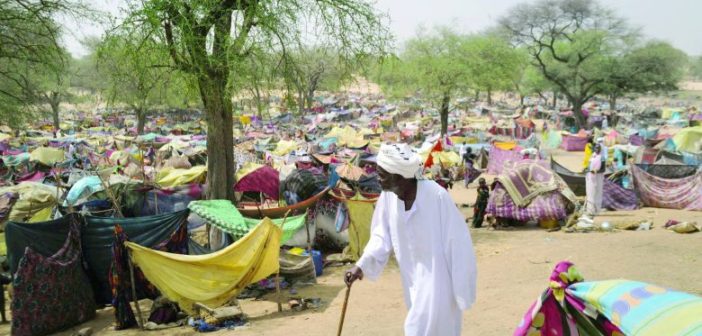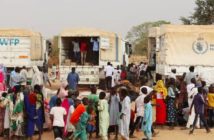Sudan’s ongoing war has generated what can be described as the worst humanitarian crisis ever happened, resulting from the ferocious war between the two clashing parties: Sudan Army and its rival Rapid Support Forces. The escalating nature of the aimlessly war being fought made the implications of the humanitarian crisis gotten worse than ever. The international reports have warned of imminent human starvation disaster at the corner threatening tens of millions of innocent civilians due to the dysfunction of economic sources. The sub-Saharan poor country which its people have suffered to secure their daily life needs, they’re desperately living on one dollar a day.
The World Food Program pointed to the difficult situation in the country as quoted: The humanitarian situation in Sudan is teetering on the brink of catastrophe after conflict erupted across the country in mid-April 2023. Since 2019, the number of people facing acute food insecurity has more than tripled from 5.8 million to nearly 18 million. Nearly 5 million of these are in emergency levels of hunger.” In this report whereas the human tragedy is plausibly seemed to be irreversible unless an urgent intervention occurred.
Both parties haven’t recognized or even willing to address the humanitarian issue which in turn is being left to be defined by war progression on the battleground. No political plans to save civilians lives nor an alternative to pave way for accession to international aid. Seemingly, the humanitarian crisis under such circumstances is considered to be a collateral damage of war—that’s to some extent true. However, in a civil war such as what’s happening in Sudan, there’s an urgent need to impose what has been stipulated in International Humanitarian law. Whether such a step to be taken international or regionally is believed to be suspected. Despite the fact that, all international agencies have been called involuntary to intervene in response to the humanitarian disaster has ravaged the Sudan’s people for months, but the political and military positions of both fighting-parties have shared the lions’ share in making the access to humanitarian aid harder if not, impossible by blocking safe roads and sometime used as a weapon tool.
The Sudan war has become a reminder of failed-state engulfed by the environmental collapse, famine, sickness, malnutrition and all other man-made disastrous faults. considerably, war has brought up the risky condition to its peak without having any intended will of policymakers or warmongers to stop it. The debacle is that, no operating economy systematically existed nor a sovereign state apparatus at work. Automatically, no international economic engagements—the country has completely been disconnected. Moreover, the military operations on the ground where each party holds bases such as seized regions and towns being in particular those held by SAF there’re so many destructions and looting of the private properties belong to the dwellers. Obviously, the situation following those actions have deteriorated and complicated the day-to-day life activities for the destitute citizens. The war has deeply impacted all walks of life.
Any serious peace deals and negotiations seeking to end Sudan’s crisis must have lifted the level of humanitarian from military and political capabilities to humanitarian one. In the same manner any other meditating role either conducted by regional or international bodies should deliberately enhance the human dimensions over any other issue that might arise from the missing peace process. All involved factors from warmongers to political activists are called to act morally towards peace to save the starved people of the afflicted country.
The goal of a peace process for Sudan is essentially required by all possible means not only to end the ongoing war on a political and military basis but also on humanitarian reasons. There’s a moral obligation for making any humanitarian international intervention to be imposed in order to contribute to save the country and its people. To achieve this, there’s no foreseeable path other than an imperative domestic reconciliation and international consultatively intervention.
Critics of slow relief to response to Sudanese crisis are as they are mentioned by many humanitarian observers as well as agencies workers, but the civil war has hindered the relief efforts. The suspension of aids has been affected by the internal factors such as the insecure ground constructions for any civil administration.
* Sudanese writer and political analyst.




